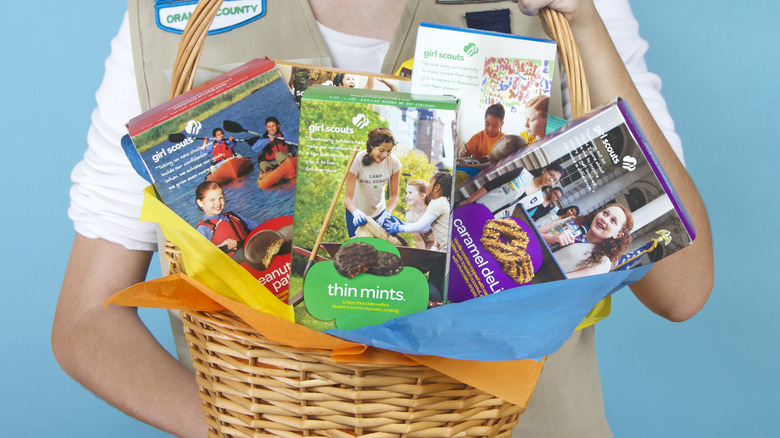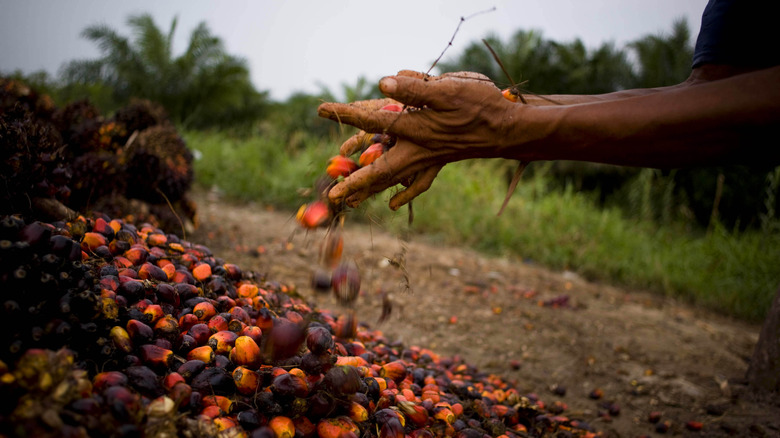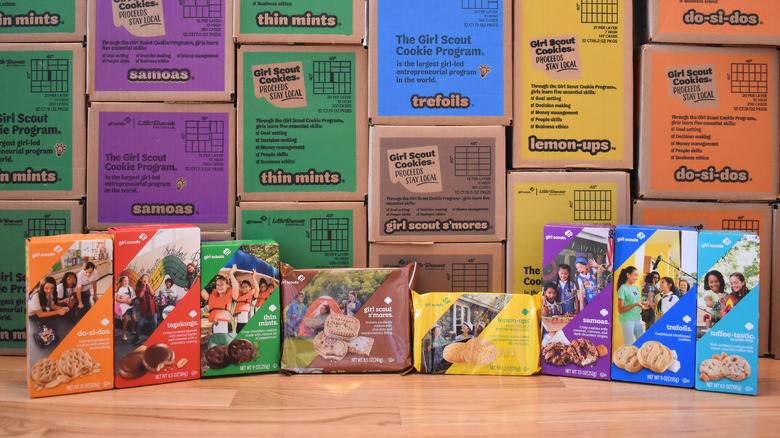The Dark Connection Between Girl Scout Cookies And Child Labor
We all love our Girl Scout cookies, not just because they taste good and they are an institution we're all keen to support, but also because they can provide a starting point for girls to learn life skills, including money management and business ethics (via Girl Scouts). So it will come as some surprise to know that the organizations that make Girl Scout cookies may be using a controversial ingredient in the treats we all love.
Palm oil is in many of the things we consume on a daily basis. As Emma Keller of the World Wide Fund for Nature put it, the substance "is in close to half of the products we buy in the supermarkets — in everything from shampoos and soaps, to pizzas and biscuits. It's everywhere" (via BBC). And while the Girl Scouts work with organizations that promised to source their palm oil responsibly, it took Tennessee Girl Scout Olivia Chaffin to discover that the "sustainable" sourcing mark found on packets of Girl Scout cookies promised more than they actually delivered, and that a deep dive into the ingredient label uncovered the fact that the sustainable palm oil used to make Girl Scout cookies was being blended with oil from other sources.
"I thought Girl Scouts was supposed to be about making the world a better place. But this isn't at all making the world better," Chaffin told the Associated Press, which did an investigative piece uncovering the link between child labor and palm oil.
Palm oil is problematic on many fronts
Palm oil is problematic on a number of fronts. The ingredient itself comes from the African oil tree, which was brought to Malaysia and Indonesia between the late 1800s and early 1900s. Because palm oil is cheap and easy to produce, rainforests — which are home to numerous endangered species, including the orangutan — are being cut down to grow more trees. The act of clearing rainforests is also responsible for the forest fires which release plenty of carbon dioxide into the air, accelerating the conditions that bring about climate change (via BBC).
Demand for palm oil isn't just creating conditions that fuel climate change; it is also creating circumstances which allow for child labor to flourish. In Indonesia, laborers who harvest palm oil kernels have been known to pull their children out of school to help gather oil kernels, in order to meet their daily quotas. In Malaysia, plantation owners often use illegal migrant workers to fill the labor gap by working on oil tree plantations. Because harvesters are officially not allowed to bring their families, children often use illegal routes to follow after their fathers, and end up trapped on plantations, with no hope of escaping or getting an education (via Associated Press).
The United Nations estimates as many as 1.5 million children between the ages of 10 to 17 in Indonesia, and 33,000 children between the ages of 5 to 11 in Malaysia work in the palm oil sector.
Girl Scout cookies aren't as sustainable as they first appear
The Associated Press says it tracked back the use of tainted palm oil to Little Brownie Bakers, a Girl Scout cookie manufacturer, which is owned by Italian food company Ferrero. Since the revelation was written, the Girl Scouts have said that both the organization and its baker "condemn the use of child labor and any exploitation of workers." It further promised that the baker would work with the Roundtable on Sustainable Palm Oil to make sure that its suppliers would stick to an international policy that would penalize companies that do not adhere to these standards.
But at the same time, the Girl Scouts has pointed out that, until a workable solution with regard to sustainability and palm oil can be achieved, its baker could only work hard "to make the complex shifts necessary to achieve their goal" of obtaining 100 percent deforestation-free and exploitation-free palm oil. Which means that, until that these "shifts" have been completed, the green tree logo that indicates that your box of Girl Scout cookies is "certified sustainable" likely does not belong there right now.


